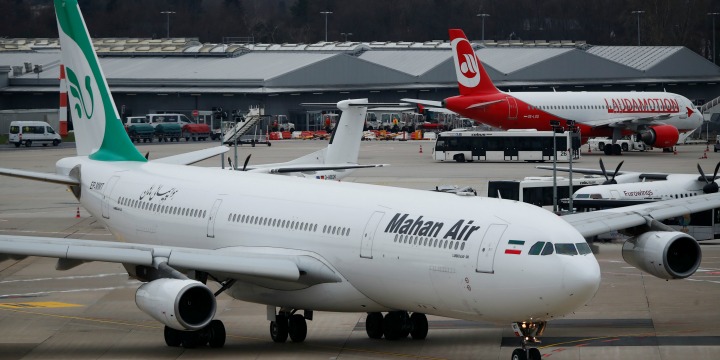
Lebanon’s Hezbollah leader Sayyed Hassan Nasrallah addresses his supporters through a screen during a rally commemorating the annual Hezbollah Martyrs’ Day, in Beirut’s southern suburbs. Photo: Reuters/Aziz Taher
An official tour of Beirut’s Rafic Hariri International Airport designed to assuage fears that the facility is being used to store Iranian weapons intended for the Lebanese terrorist organization Hezbollah was cut short as reporters were denied access to a key cargo depot.
The Telegraph, a British newspaper, reported on Sunday that Beirut’s airport is used by Hezbollah — which wields significant political and military influence across Lebanon — to store an enormous number of missiles and other weapons sent from Iran, its chief international backer. An unnamed whistleblower in the report claimed that after Hamas’ Oct. 7 massacre across southern Israel, the airport received “unusually large boxes” on flights from Iran.
In response to these allegations, Lebanese Transportation Minister Ali Hamieh — who is affiliated with Hezbollah — denied the report and invited foreign press and observers to tour the airport. “We have nothing to hide,” Hamieh claimed at a press conference before the tour.
According to the Saudi news outlet Al-Hadath, however, reporters invited to tour the airport were not allowed to see its cargo center.
“Beirut airport security prevented journalists from entering the cargo center at the airport,” Al-Hadath journalist Ghinwa Yateem reported after the tour concluded, adding that Lebanese officials “did not let us film or enter certain areas.”
The tour of Beirut’s airport featured a specific cargo facility that “accounts for 20 percent of the import traffic,” according to Hamieh. A video of the warehouse shown on the tour revealed a near-empty warehouse of goods, as Lebanese officials denied The Telegraph‘s reporting. The facility that houses 80 percent of the airport’s imports was not shown to the press and other observers.

A video shows a near-empty cargo depot at Beirut’s Rafic Hariri International Airport. Photo: Screenshot
Flight records from Flightaware — a flight tracking service — show regularly scheduled flights between Iran and Lebanon. Mahan Air flies weekly using widebody A340 planes between Tehran’s Mehrabad International Airport and Beirut’s Rafic Hariri International Airport. In 2020, the US government sanctioned Mahan Air because of the airline’s “long record of ferrying weapons and terrorists around the world for Iran.”

A Mahan Air Airbus A340-300 taxis at Duesseldorf airport in Germany, Jan. 16, 2019. Mahan Air routinely flies an A340-300 from Tehran to Beirut. Photo: Reuters / Wolfgang Rattay.
In Israel’s north, Hezbollah terrorists have been firing rockets at Israel daily from southern Lebanon since Hamas’ Oct. 7 massacre, leading Israeli forces to strike back. Tensions have been escalating between both sides, fueling concerns that the conflict in Gaza — the Palestinian enclave ruled by Hamas, another Iran-backed Islamist terrorist group, to Israel’s south — could escalate into a regional conflict.
More than 80,000 Israelis evacuated Israel’s north in October and have since been unable to return to their homes. The majority of those spent the past eight months residing in hotels in safer areas of the country.
Last week, Hezbollah’s Foreign Relations chief Khalil Rizk threatened both Israel and the US in an interview with Lebanon’s Al-Manar and translated by the Middle East Media Research Center (MEMRI). In the interview, Rizk claimed that Jewish “worship instructs him to oppress people, to shed the blood of the Palestinians, and to drive these people out of Palestine.” He also threatened America. “Is this war now with Israel?” he asked. “My answer is that it is not a war with Israel. Israel is merely a tool. The main war, the real war, is with America.”
Allegations of Iran using Rafic Hariri Airport as a weapons depot would not be the first time Iran has allegedly used public infrastructure to transport weapons and support terrorism. During the Syrian civil war, Israel targeted Syrian airports accused of housing Iranian weapons. Last May, for example, Syria’s Aleppo airport was hit by a purported Israeli airstrike after the facility received an arms shipment from an Iranian plane.
Hezbollah routinely stores dangerous weapons and explosive material in public spaces. In 2020, the world’s “largest nonnuclear explosion” shook Beirut when a silo of ammonium nitrate exploded at Beirut’s port. Hezbollah was widely blamed for the explosion, and a formal investigation was launched into the incident.

A general view shows the aftermath at the site of a large blast in Beirut’s port area, Lebanon August 5, 2020. Photo: REUTERS/Mohamed Azakir/File Photo
Rafic Hariri International Airport has seen an uptick in Lebanese and foreign nationals fleeing a potential conflict between Israel and Hezbollah. The airport is Lebanon’s main transportation artery. In 2023, roughly seven million travelers used the airport.